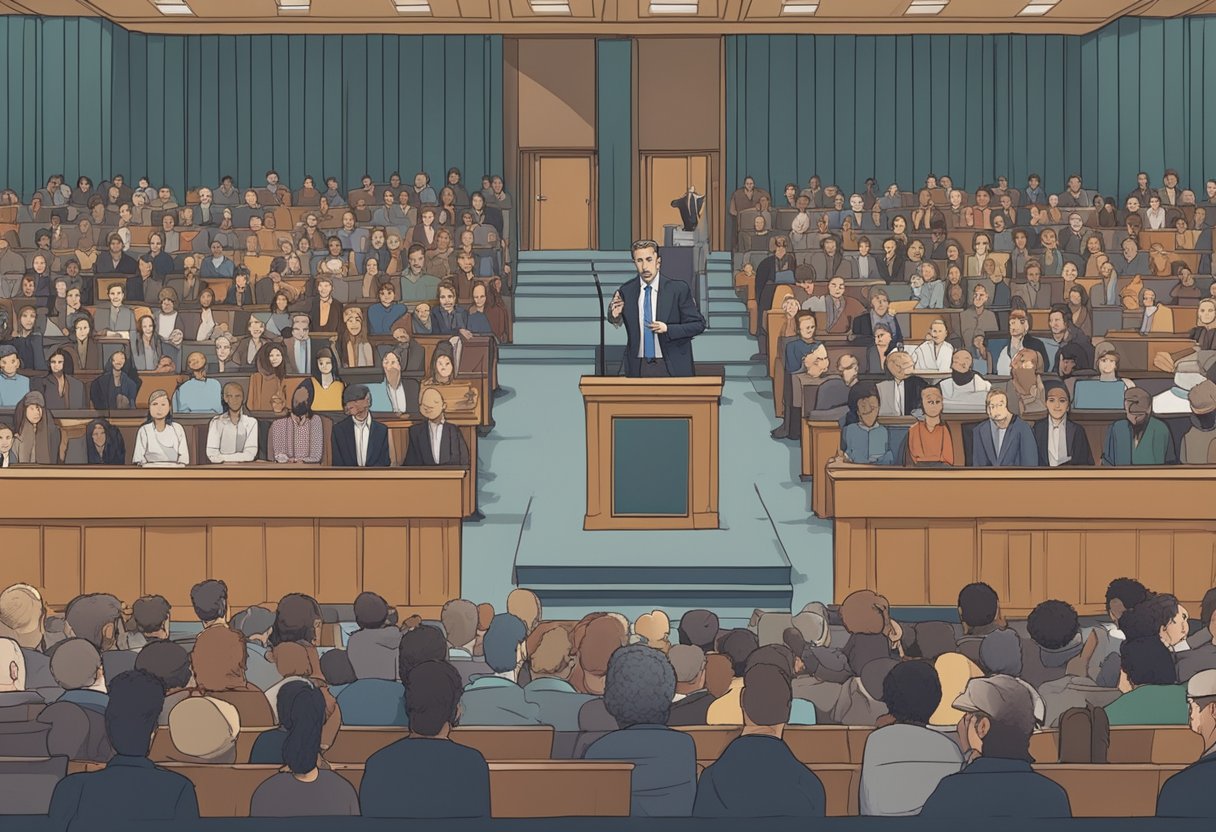Jordan Peterson and Sam Harris are two of the most prominent public intellectuals of our time. Both have gained popularity for their philosophical and scientific views, as well as their willingness to engage in debates on controversial topics. While they share some common ground, they also have fundamental differences in their beliefs, which have led to heated discussions and disagreements.

Biographically, Jordan Peterson is a Canadian clinical psychologist, cultural critic, and professor of psychology at the University of Toronto. He gained widespread attention for his views on political correctness, gender, and free speech. He has also authored several books, including the bestseller "12 Rules for Life: An Antidote to Chaos." On the other hand, Sam Harris is an American author, philosopher, and neuroscientist. He is known for his advocacy of atheism, meditation, and rationality. He has written several books, including the New York Times bestseller "The End of Faith."
Philosophically, Peterson and Harris have different standpoints on many issues. Peterson has been critical of postmodernism, identity politics, and the progressive left, while Harris has been critical of religion, dogma, and irrationality. They have engaged in debates on topics such as morality, free will, consciousness, and the nature of reality. While they have disagreed on many issues, they have also found common ground on some, such as their opposition to political correctness and their support for free speech.
Key Takeaways
- Jordan Peterson and Sam Harris are two prominent public intellectuals who have gained popularity for their philosophical and scientific views, as well as their willingness to engage in debates on controversial topics.
- Peterson is known for his criticism of postmodernism, identity politics, and the progressive left, while Harris is known for his advocacy of atheism, meditation, and rationality.
- While they have disagreed on many issues, they have also found common ground on some, such as their opposition to political correctness and their support for free speech.
Biographical Overviews

Jordan Peterson: Life and Career
Jordan Peterson is a Canadian psychologist, author, and former professor of psychology at the University of Toronto. He was born on June 12, 1962, in Edmonton, Alberta, Canada. Peterson earned his Bachelor of Arts degree in political science in 1982 and his Bachelor of Arts degree in psychology in 1984 from the University of Alberta. He went on to earn his Ph.D. in clinical psychology from McGill University in 1991.
Peterson gained international attention in 2016 after he refused to use gender-neutral pronouns in his classes, which he argued was a violation of his freedom of speech. This controversy led to his rise as a public figure, with his book "12 Rules for Life: An Antidote to Chaos" becoming a best-seller.
Sam Harris: Life and Career
Sam Harris is an American author, philosopher, and neuroscientist. He was born on April 9, 1967, in Los Angeles, California, USA. Harris completed his Bachelor of Arts degree in philosophy at Stanford University in 1990 and his Ph.D. in neuroscience at the University of California, Los Angeles in 2009.
Harris is known for his criticism of religion and his advocacy for secularism and rationality. He is a vocal atheist and has authored several books on the subject, including "The End of Faith" and "Letter to a Christian Nation". Harris has also been involved in several public debates with religious figures, including a widely publicized debate with Christian apologist William Lane Craig.
Philosophical Standpoints
Peterson's Worldview
Jordan Peterson is a Canadian professor of psychology and a cultural critic. He is known for his philosophical views on morality, religion, and the nature of reality. Peterson's philosophy is based on the idea that humans have an innate capacity for religious belief and that religious stories and archetypes are essential for understanding the world and living a meaningful life. He argues that Christianity, in particular, is a necessary foundation for Western civilization and that its teachings provide a framework for moral behavior.
Peterson's worldview is heavily influenced by his belief in the existence of objective truth. He argues that truth is not relative but is instead grounded in the nature of reality. Peterson believes that humans have a responsibility to seek out and embody the truth, and that this pursuit is essential for living a meaningful life.
Harris's Perspective
Sam Harris is an American author, philosopher, and neuroscientist. He is known for his advocacy of atheism, his criticism of religion, and his promotion of scientific inquiry. Harris is one of the leading figures of the New Atheism movement, which seeks to promote a scientific worldview and reject supernatural beliefs.
Harris's philosophy is based on the idea that scientific inquiry is the best method for understanding the world and that religious beliefs are often harmful and irrational. He argues that morality can be grounded in reason and that humans have a responsibility to use their rational faculties to promote the well-being of themselves and others.
Harris's perspective is heavily influenced by his belief in the importance of reason and evidence. He argues that beliefs should be based on empirical evidence and that irrational beliefs should be rejected. Harris believes that humans have a responsibility to promote the well-being of all sentient beings, and that this can be achieved through reason and compassion.
Religious Debate and Critique
Criticism of Religion
Jordan Peterson and Sam Harris have engaged in several debates on the topic of religion. Harris, an atheist, has been a vocal critic of religion, arguing that it is a source of dogma, irrationality, and violence. He contends that religious texts are not a reliable source of moral guidance and that belief in God is not necessary for ethical behavior. Harris has also criticized Christianity for its history of violence and intolerance.
Peterson, on the other hand, has defended religion as a source of meaning and morality. He argues that religious belief is necessary for a well-lived life and that religious texts offer valuable guidance on how to live ethically. Peterson has also criticized Harris for failing to appreciate the value of religious belief and for promoting a nihilistic worldview.
Defense of Religious Belief
Peterson's defense of religious belief is grounded in his view that human beings need a sense of purpose and meaning in their lives. He argues that religious belief provides a framework for understanding the world and for living a meaningful life. Peterson also contends that religious belief is necessary for ethical behavior, as it provides a foundation for moral values and principles.
Harris, however, maintains that religious belief is not necessary for a meaningful life or for ethical behavior. He argues that human beings can find meaning and purpose in a variety of ways, such as through personal relationships, creative pursuits, and social activism. Harris also contends that ethical behavior can be grounded in reason and empathy, rather than in religious belief.
In their debates, Peterson and Harris have explored these and other issues related to religion and belief. While they have disagreed on many points, their discussions have shed light on the complexities of these topics and have sparked important conversations about ethics, morality, and the role of religion in society.
Discussions on Morality and Ethics
Objective Morality
Jordan Peterson and Sam Harris have engaged in numerous discussions on the topic of morality and ethics. One of the key points of contention between the two is whether there exists an objective basis for morality or whether it is entirely subjective. Peterson argues that morality is grounded in objective knowledge and that it is possible to derive moral values from this knowledge. He believes that there are universal moral truths that are independent of human opinion or cultural norms. In contrast, Harris argues that morality is based on subjective experiences and that there are no objective moral truths.
In his book "The Moral Landscape," Harris argues that there are objective facts about what is good and what is bad for human beings. He believes that science can help us determine what actions are most likely to lead to human flourishing and that we should base our moral judgments on this knowledge. Peterson, on the other hand, argues that moral values are grounded in archetypes and that they are not reducible to scientific knowledge. He believes that there are certain values that are inherent to human nature and that these values should guide our moral decisions.
Subjective and Archetypal Morality
Peterson's view of morality is heavily influenced by his belief in archetypes. He argues that archetypes are universal patterns of behavior that are deeply ingrained in the human psyche. He believes that moral values are derived from these archetypes and that they are not entirely subjective. Peterson argues that there are certain values that are common to all human cultures and that these values are grounded in archetypal patterns of behavior.
Harris, on the other hand, argues that morality is based on subjective experiences and that there are no objective moral truths. He believes that moral values are grounded in human well-being and that science can help us determine what actions are most likely to lead to human flourishing. Harris argues that moral values are not derived from archetypes or any other metaphysical concept, but rather from our shared experiences as human beings.
In conclusion, Peterson and Harris have very different views on the nature of morality and ethics. Peterson believes that morality is grounded in objective knowledge and archetypes, while Harris argues that it is based on subjective experiences and human well-being. Both thinkers have made significant contributions to the ongoing debate about the nature of morality and ethics, and their ideas continue to be the subject of much discussion and debate.
Dialogues and Public Conversations
Jordan Peterson and Sam Harris are two of the most prominent intellectuals of our time, known for their thought-provoking ideas and public discussions. They have engaged in several dialogues and debates that have garnered immense attention from audiences around the world.
Notable Public Debates
One of the most notable public debates between Peterson and Harris was held in 2018, moderated by journalist Bret Weinstein. The debate focused on the topic of free speech and was held in front of a live audience. The discussion was intense and thought-provoking, with both parties presenting their arguments in a clear and concise manner.
Peterson and Harris have also engaged in several other debates, including a discussion on the topic of religion and spirituality. These debates have been widely viewed on YouTube and other platforms, with millions of people tuning in to hear the ideas presented by these two thinkers.
Podcasts and Interviews
In addition to their public debates, Peterson and Harris have also participated in several podcasts and interviews. They have been guests on each other's podcasts, as well as on other popular podcasts such as The Joe Rogan Experience.
These podcasts and interviews have allowed Peterson and Harris to delve deeper into their ideas and explore topics in greater detail. They have also given audiences a chance to hear more personal stories from these two prominent intellectuals.
Overall, the dialogues and public conversations between Jordan Peterson and Sam Harris have been a valuable contribution to the world of ideas. Their discussions have challenged audiences to think critically and consider new perspectives on a wide range of topics.
Cultural and Political Commentary
Peterson's Cultural Critique
Jordan Peterson is known for his cultural critique, which he argues is necessary to combat the chaos that he sees as inherent in post-modernism and moral relativism. He believes that society needs order to function properly and that this order is threatened by the rejection of traditional values and hierarchies.
Peterson is a vocal advocate for free speech and has criticized the rise of political correctness on university campuses, arguing that it stifles free speech and prevents the open exchange of ideas. He has also been critical of identity politics and the emphasis on group identity over individual responsibility.
Peterson's cultural commentary extends beyond social issues to economic and political issues as well. He has argued that the current economic system is flawed and that it is contributing to the decline of Western civilization. He has also been critical of socialism and communism, arguing that these systems are fundamentally flawed and lead to tyranny.
Harris's Political Analysis
Sam Harris, on the other hand, is known for his political analysis. He has been critical of both the left and the right, arguing that both sides are contributing to the polarization of American politics.
Harris has been a vocal advocate for reason and evidence-based decision making, and he has criticized the role of religion in politics. He has argued that religion is often used as a justification for violence and that it is incompatible with a modern, secular society.
Harris has also been critical of the current economic system, arguing that it is contributing to income inequality and social unrest. He has advocated for a more equitable distribution of wealth and for policies that support the middle class.
Both Peterson and Harris offer unique perspectives on cultural and political issues, and their work has sparked important conversations about the future of Western civilization.
Scientific Discussions and Disputes
Science vs. Religion
Jordan Peterson and Sam Harris have had several discussions and debates on the topic of science vs. religion. Harris argues that religion is a hindrance to scientific progress because it relies on faith rather than evidence-based reasoning. Peterson, on the other hand, believes that religion has played an important role in shaping human history and culture and that it can provide a framework for moral values.
Peterson argues that science cannot answer all of life's questions and that there are certain aspects of human experience that are best understood through religious or spiritual means. He also believes that the naturalistic fallacy, which argues that what is natural is inherently good, is a flawed way of thinking that ignores the complexities of human behavior and history.
Harris, however, argues that science is the best tool we have for understanding reality and that we should rely on evidence-based reasoning rather than faith or tradition. He believes that religion has been responsible for many of the world's conflicts and that it is time to move beyond it.
Psychology and Human Behavior
Peterson and Harris have also had discussions on the topics of psychology and human behavior. Peterson's work on the dominance hierarchy and its role in human behavior has been a point of contention between the two. Peterson argues that the dominance hierarchy is a fundamental aspect of human behavior and that it is necessary for survival.
Harris, however, argues that the dominance hierarchy is a social construct that can be harmful and that we should strive to create a more egalitarian society. He believes that our understanding of human behavior should be based on evidence-based research rather than anecdotal evidence or personal beliefs.
Overall, while Peterson and Harris have different views on the role of religion and science in society, they both agree that our understanding of reality should be based on evidence-based reasoning and that we should strive to create a better society based on our understanding of human behavior and history.
Influence and Impact

Peterson's Influence
Jordan Peterson has had a significant influence on society through his ideas and public intellectual character. He has been a prominent figure on YouTube, where his lectures and interviews have been viewed by millions of people worldwide. Peterson's ideas about the importance of meaning, responsibility, and the role of the individual in society have resonated with many people.
Peterson's work has been particularly influential in the realm of personal development. His book "12 Rules for Life: An Antidote to Chaos" has sold millions of copies and has been translated into over 50 languages. The book has been praised for its practical advice on how to live a more conscious and fulfilling life.
Peterson's influence has also been felt in the political sphere. He has been critical of political correctness and has advocated for free speech and individual rights. His views on these topics have been controversial, but they have also sparked important conversations about the role of government in regulating speech and expression.
Harris's Impact
Sam Harris has had a significant impact on society through his work on consciousness, well-being, and morality. He has been a prominent figure in the field of neuroscience and has written several books on the topic, including "The End of Faith" and "Waking Up."
Harris's work has been influential in the realm of personal development, particularly in the area of mindfulness and meditation. He has been a vocal advocate for the benefits of these practices and has written extensively about their impact on mental health and well-being.
Harris's impact has also been felt in the realm of morality. He has been critical of religious dogma and has advocated for a more rational and evidence-based approach to ethics. His views on these topics have been controversial, but they have also sparked important conversations about the role of religion in society and the nature of morality.
Overall, both Peterson and Harris have had a significant influence on society through their work as public intellectuals. While their views on certain topics may be controversial, they have sparked important conversations and have encouraged people to think more deeply about issues such as meaning, consciousness, and morality.
Frequently Asked Questions

What are the main differences in beliefs between Jordan Peterson and Sam Harris?
Jordan Peterson and Sam Harris have different views on several topics, including religion, morality, and the role of government. Peterson is a clinical psychologist and a professor of psychology, and he often emphasizes the importance of religion and traditional values. On the other hand, Harris is a neuroscientist and a philosopher who advocates for a secular society and rational thinking.
How do Jordan Peterson and Sam Harris approach the topic of religion and spirituality?
Peterson believes that religion is a crucial aspect of human life and that it provides individuals with a sense of purpose and meaning. He argues that religion is necessary for a stable society and that it helps people to overcome adversity. Harris, on the other hand, is critical of religion and believes that it is a source of conflict and irrationality. He advocates for a secular society and the use of reason and science to solve problems.
What are some notable public debates or discussions involving Jordan Peterson and Sam Harris?
Peterson and Harris have engaged in several public debates and discussions, including a series of conversations in 2018. They have also debated topics such as free will, morality, and the role of religion in society. Their discussions have been widely watched and have sparked controversy and debate among their followers.
Can you summarize the key points of contention between Jordan Peterson and Sam Harris during their discussions?
One of the main points of contention between Peterson and Harris is their differing views on religion. Peterson argues that religion is necessary for a stable society, while Harris believes that it is a source of conflict and irrationality. They have also debated the role of government, with Peterson advocating for individual responsibility and Harris advocating for a more active role for government in solving social problems.
What are the philosophical similarities between Jordan Peterson and Sam Harris, if any?
Despite their differences, Peterson and Harris share some philosophical similarities. Both emphasize the importance of personal responsibility and the need for individuals to take control of their lives. They also both advocate for the use of reason and evidence-based thinking to solve problems.
How do fans of Jordan Peterson and Sam Harris perceive the interactions and debates between the two?
Fans of Peterson and Harris have different views on their interactions and debates. Some view their discussions as a productive exchange of ideas, while others see them as unproductive and divisive. There are also those who believe that one or the other is clearly superior in their arguments and reasoning.
